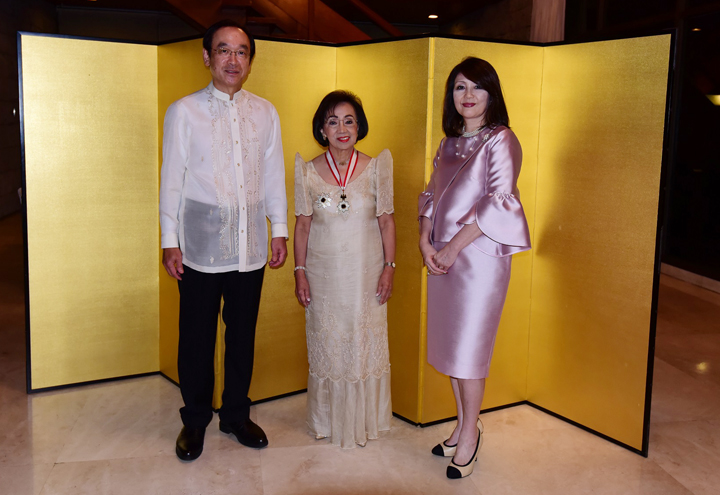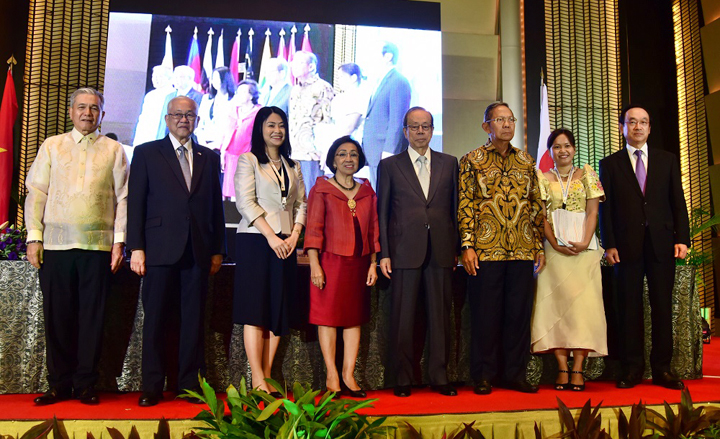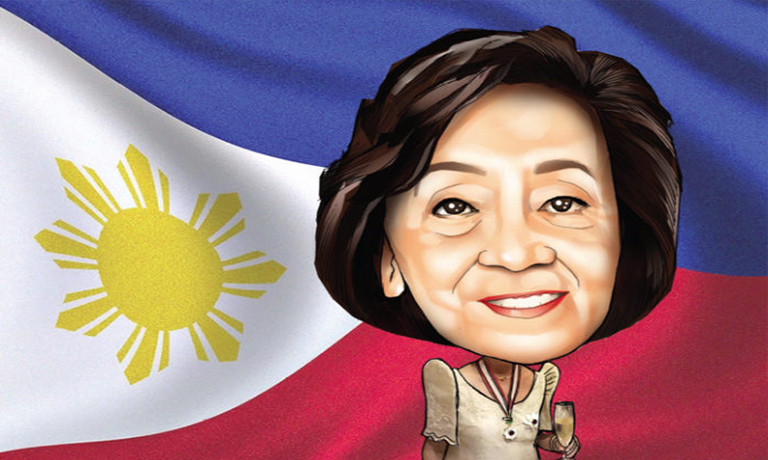Good things come in small packages—so goes the old saying. Former ambassador and foreign affairs secretary Delia Domingo Albert is like a tiny magnum of Chanel No. 5 Grand Extrait—perhaps the most expensive on the planet fetching a price tag of $4,200 an ounce.
Albert speaks French, Japanese, English, Spanish and Filipino—a formidable talent but gentle soul in the Department of Foreign Affairs (DFA) during her tenure.

The latest feather in her cap was bestowed on May 23 at the Imperial Palace in Tokyo by no less than the emperor of Japan: The Order of the Rising Sun, Gold and Silver Star—one of the highest recognitions given by the said country.
Japanese Ambassador Koji Haneda, who recently hosted a celebration of her achievement, provided a perspective of the accolade: “It is awarded to select individuals who, through their work in various fields, have made tremendous contributions toward furthering the friendship and mutual understanding between our two peoples.”
“It is worth noting that Albert is one of the very first recipients of this award in the new Reiwa era of Japan. In all these instances, she has consistently shown her sterling character as an exemplary leader and professional, strongly dedicated to strengthening the friendship between our two nations.”
Haneda then declared: “She is truly a class of her own.”

In a statement, the Japanese Embassy noted that during her tenure as foreign affairs secretary from 2003 to 2004, Albert took the initiative of negotiating for the Japan-Philippines Economic Partnership Agreement (Jpepa), which greatly contributed to the enhancement of the economic relationship between the two countries, especially in the area of their people exchanges.
When she served as Presidential Advisor for Multilateral Cooperation and Development in 2004 and 2005, the diplomat also contributed to the promotion of inviting Japanese private sectors in the Philippines in the mining industry.
Further, as senior advisor of Sycip Gorres Velayo & Co., she has been supporting Japanese companies in the Philippines in various ways.
Celebrated career
Albert responded to Haneda’s gracious words with a brief summary of her years in the Philippine foreign service:
“My own Japanese story began at the University of the Philippines [UP], where a noted specialist on Japan, Professor Josefa Saniel, impressed me with her keen knowledge and appreciation of the [Land of the Rising Sun] that I aspired to see for myself what I had learned about the fascinating country.”
Opportunity came in 1962 when, just fresh out of UP, she participated in an international student seminar at Tsuda College in Tokyo. This was followed by a work camp in Awaji-shima, “where, together with Japanese and foreign students, we all worked in a road that would link [a small fishing village called Nigoro to its adjacent places].”
“It was my first experience not only in physically building a road with a pick and shovel, but an opportunity to build friendships with people from different nationalities and cultures, especially with [the local] people.”
Inspired by the activity, it became the subject of her speech, Dai San No Michi, or “The Third Road,” which earned her a prize in a competition for foreign students sponsored by broadcast network NHK and national newspaper Asahi Shimbun.
That recognition led to an appearance on television and a magazine cover, “which gave me the opportunity to promote [and create] awareness of the Philippines in Japan.”
She narrated that after her stint in the foreign service, “I became the first woman-career diplomat to serve as secretary [minister] of foreign affairs in Asia.”
“I felt a natural responsibility to promote women participation not only in diplomacy, but especially in the economy,” she proudly announced.
Coming back to the country in 1962 after her studies, she was invited “to introduce then-secretary of Foreign Affairs Narciso Ramos at the annual Soiree Diplomatique of the UP Foreign Service Corps.
She found Ramos’s curriculum vitae so brief and could find nothing more to provide him with a more compelling description. “I introduced him in three languages: English, French and Japanese,” she gleefully recounted.
The “intro” impressed Ramos “more than the audience—that on the spot, he appointed me as his social secretary because, as he said, I could say ‘no’ in different languages and [qualified me] as his cordon sanitaire.”
“Soon, I was arranging negotiations on the host agreement between the Philippines and the Asian Development Bank, which [at that time] had just been founded.”
In her acceptance speech, Albert acknowledged a dear friend as well as a partner in economic diplomacy, and who was a fellow recipient of the Order of the Rising Sun, Gold and Silver Star: Lilia de Lima. The latter, according to the former DFA chief, is a trusted and respected director general of the Philippine Economic Zone Authority or Peza. It was de Lima who successfully convinced Japanese companies to invest, as well as increase their presence in the Philippines.
Albert profusely thanked Haneda, “for [the] kind and generous hospitality,” then his countrymen and government for the singular honor of her recent conferment.
The former DFA chief proudly claimed that it was no less than Prime Minister Shinzo Abe who handed her gleaming symbols, “followed by a most heartwarming and memorable audience with His Majesty, Emperor Naruhito.”
‘Womenomics’
In 2016, Albert led a group of Filipino women-entrepreneurs who met with their Japanese counterparts at the 26th Global Summit of Women in Tokyo, “in support of Prime Minister [Shinzo] Abe’s policy of ‘womenomics.’”
She recounted that in July, Haneda and his wife Ihoko visited her hometown of Baguio City. There, they met the new set of city officials, as well as descendants of former Japanese settlers “who worked on the construction of the famous winding mountain road of Kennon from 1903 to 1909.”
It was shared that, during her visit in the Baguio market, Ihoko was pleasantly surprised to see familiar fruits and vegetables ichigo and daikon, “introduced by the Japanese communities who settled mainly in Trinidad Valley, which [eventually] became known as the ‘Salad Bowl of the Philippines.’”
“For me personally, road-building—whether in the island of Awaji-shima or in Kennon Road—represents a very special connection between the Philippines and Japan,” she pointed out, and added that not only did they connect places. “They also connected people.”
Decorated diplomat
Albert obtained her Bachelor’s degree in international relations from the State University’s Diliman campus before she matriculated in a number of institutions overseas, including the Graduate Institute of International and Development Studies in Geneva, the Diplomatic Institute in Salzburg, Boston University, and the John F. Kennedy School of Government at Harvard University, among others.
She was a career diplomat and was the country’s secretary of Foreign Affairs from December 22, 2003, until August 18, 2004.
Albert’s career in the DFA began as an assistant in the Office of the Secretary of Foreign Affairs in 1967. In 1969, she began to serve in various capacities in Filipino diplomatic missions abroad: at the delegation to the United Nations in Geneva, Switzerland, (1969–1975); at the embassy in Romania, which also managed Filipino relations with Hungary and East Germany, (1975–1980) and at the embassy in Bonn. The former envoy also represented the Philippines in Switzerland, Romania, Hungary, Germany and Australia.
The Philippine Women’s University conferred on her the title of Doctor of Humanities, honoris causa, for building a gender-fair society. Her alma mater distinguished her as the Most Distinguished Alumna in 2012.
For her meritorious and exceptional service to the country, Albert was conferred the Presidential Order of Sikatuna with the rank of Datu, and, in 2004, was given the title Bai-A-Rawatun sa Pilipinas for assisting Muslim women in their search for peace and development.
Albert also received the Knight Commander’s Cross of the Order of Merit with Star (BundesVerdienstKreuz) from the Federal Republic of Germany.
She, likewise, helped midwife the Asean, after being tasked by Ramos “to arrange calls and meetings of the secretary’s counterparts in Indonesia, Malaysia, Thailand and, later on, with Singapore.”
By coincidence, and much later in her career, she was involved in connecting the youth of Asean, made possible by the Fukuda fund, now known as the Asean Cultural Fund. “To my mind,” Albert opined, “it was, and remains, the most effective investment-building in the Asean sociocultural community.”
Albert said this prompted her to hail former Japanese Prime Minister Takeo Fukuda as the “Father of Asean-Japan relations.”
When economic diplomacy became the focus of the Philippines’s foreign policy, she averred that the country pursued the negotiations for the Jpepa, “which provides the framework for increased bilateral trade relations.”
Also an author
Fast-forward to a few weeks back, in an informal exchange during the Austrian National Day, Albert said she fondly remembers former President Fidel V. Ramos, “for his far-reaching vision for the country.”
During his tenure, Albert shared that Ramos told her to go to Australia to negotiate a defense cooperation agreement.
“He knew what was important. So, [there I went] and negotiated the most important cooperation agreement for training our military, because I wanted them to be real professionals.”
At that point, she broached the idea of relaunching her book, Women in Diplomacy, a 250-page tome, at the Manila House in Bonifacio Global City, Taguig, on November 27.
The original introduction happened at the DFA, “when we invited all our diplomats to come home,” with an aim to give our envoys “an idea what [real] foreign policy means.”
The former career diplomat revealed that her book documents the stories of our remarkable ambassadors in the Philippine Foreign Service.
She revealed that former UN Secretary-General Kofi Annan, the Ghanaian diplomat and Nobel Peace Prize winner, told her when she used to be the chairman of the UN Security Council: “I’m so glad that a woman is chairing the SC. And, by the way, I have met remarkable women diplomats from the Philippines.”
“So, I used that as the title of my book.”
Putting context into the tome, Albert explained the foreign policies of Philippine presidents, from Emilio Aguinaldo to Duterte.
She said among the many busts at the lobby of the DFA headquarters, “I’m the only woman in that lineup of foreign ministers. I’m the first female ambassador-foreign minister in Asia.”
According to Albert, “That’s what challenged me to do this book. It is not for me; it’s to lift the image of the country, [because] we are suffering from…” She paused to place her listeners in suspense, then just rolled up her eyes.
“Having been a diplomat for 44 years, I should know. We are professionals. We serve the office, not the person. That’s the big difference.”
Image Credits: Jimbo Albano | Source: BusinessMirror

